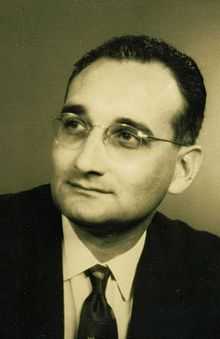Ray Wijewardene
| Philip Revatha Wijewardene | |
|---|---|
 Ray Wijewardene (Early 20s) | |
| Born |
Philip Revatha Wijewardene 20 August 1924 Colombo, Ceylon |
| Died |
18 August 2010 (aged 85) Colombo, Sri Lanka |
| Nationality |
|
| Other names | Ray |
| Alma mater |
C.M.S. Ladies' College, Colombo St Thomas’ College Mount Lavinia Peterhouse College Harvard Business School |
| Occupation | Engineer, Farmer |
| Known for | Two-wheel tractor |
| Spouse(s) | Seela de Mel |
| Children | Anoma, Roshini, Mandy |
Deshamanya Vidya Jyothi Dr Philip Revatha "Ray" Wijewardene (Sinhala:පිලිප් රෙවත විජයවර්ධන) (20 August 1924 – 18 August 2010) was a Sri Lankan Engineer, Aviator, Inventor and Olympian athlete. He was an authority on tropical farming and natural resource management, on which topics he originated systemic thinking. He also invented a number of devices to assist small farmers in developing countries.
Education and career
Philip Revatha (Ray) Wijewardene was born in Colombo, Ceylon, on 20 August 1924. He had his primary and secondary education at CMS Ladies’ College, Colombo, and St Thomas’ College Mount Lavinia, both private Anglican schools. He proceeded to Peterhouse College, University of Cambridge, UK, where he studied three branches of engineering—aeronautical, mechanical and agricultural, and earned the degree of M.A. (Cantab). He also qualified as a Chartered Engineer in the UK and Sri Lanka, and later followed a course in business administration at the Harvard Business School.
During the 1970s, Wijewardene worked as an expert on tropical farming systems with the UN Food and Agriculture Organisation (FAO) and the World Bank. He was head of agricultural engineering at the Mechanization and Automation Research Centre (MARDI),[1] in Kuala Lumpur, Malaysia, from 1973 to 1974. He later served as head of agricultural engineering and research at the International Institute of Tropical Agriculture (IITA) in Ibadan, Nigeria (1975–1980).
Ray worked with Sri Lanka’s business, research and policy communities in his areas of expertise. He held various appointments as Chairman of the Tea Research Board, head of the Inventors’ Commission and a member of several public sector bodies concerned with agriculture, science and technology.[2] He was Chancellor of the University of Moratuwa. (2002–2007). The government of Sri Lanka awarded him the highest national honours of Vidya Jyothi (Luminary of Science) and Deshamanya (Pride of the Nation) for distinguished public service.
Professional achievements
In 1955, Wijewardene designed a two-wheeled, walking tractor to help small farmers in the tropics to mechanise their work. An early attempt to mechanize farm labour during the Green Revolution, it was manufactured and marketed worldwide by the Landmaster company in Nottingham, UK.[3] Having promoted the tractor with farmers in Africa, Asia and Latin America for a decade, Wijewardene later questioned its value addition to poor farmers cultivating small holdings in the developing world.
His lifelong interest was to help small farmers to grow more food without high external inputs. He searched for natural ways to manage soil fertility and weeds in tropical farmlands.[4] He promoted a soil conservation technique called Sloping Agricultural Land Technology (SALT),[5] originally developed in the Philippines. SALT involved terracing of land, use of leaf mulch, and re-introducing perennial trees into rain-fed farming.[6]
After returning to Sri Lanka in 1980, Wijewardene spent the rest of his years researching and promoting ecologically sustainable agriculture and renewable energy technologies. He experimented with rain-fed farming[7] and agroforestry methods on his coconut estate in Kakkapalliya,[8] in Sri Lanka’s Intermediate Zone. He also did field tests for dendro[9] thermal power, the generation of electricity from firewood. This technology is increasingly used by industry. He also introduced inter-cropping gliricidia with coconut, vastly increasing coconut yields.
Sporting accomplishments
Wijewardene engaged in the water sports of rowing and sailing, and represented Sri Lanka in international competitive events. He competed in the XIX Summer Olympic Games in Mexico in 1968, and won a Silver medal[10] at the 6th Asian Games in Bangkok in 1970. He was a member of both the Colombo Rowing Club and the Ceylon Motor Yacht Club.[11]
As an aviator, he held a pilot license to fly fixed-wing aircraft, helicopters and autogyros. He experimented with building and flying ultra-light aircraft and helicopters, and trained a large number of pilots and aircraft technicians.
Notes
- ↑ "Laman Utama - Portal Rasmi Institut Penyelidikan dan Kemajuan Pertanian Malaysia". Mardi.gov.my. 2011-09-28. Retrieved 2012-05-31.
- ↑ "Ray Wijewardene Curriculum vitae". Raywijewardene.net. Retrieved 2012-05-31.
- ↑ "Passionate champion of small farmers and big ideas". Sundaytimes.lk. Retrieved 2012-05-31.
- ↑ "Sustainable Agriculture". Ray Wijewardene. 2010-08-19. Retrieved 2012-05-31.
- ↑ Wednesday (2009-08-19). "Bansalan: A Town of Sustainable Farming Methods with Sloping Agricultural Land Technology - Places - Latest - Gaia Discovery Eco Living Sustainable Tourism Heritage". Gaiadiscovery.com. Retrieved 2012-05-31.
- ↑ "Ray Wijewardene & SALT: A brief History". Raywijewardene.net. Retrieved 2012-05-31.
- ↑ "WASSAN". Rainfed Farming. Retrieved 2012-05-31.
- ↑ "Kakkapalliya Map | Sri Lanka Google Satellite Maps". Maplandia.com. Retrieved 2012-05-31.
- ↑ "Energy Forum - Sri Lanka". Efsl.lk. Retrieved 2012-05-31.
- ↑ "Passing away of Dr. Ray Wijewardane | National Olympic Committee of Sri Lanka". Srilankaolympic.org. 2010-08-18. Retrieved 2012-05-31.
- ↑ "Ceylon Motor Yacht Club - Sri Lanka". Cmyc.lk. Retrieved 2012-05-31.